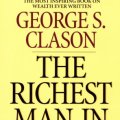Seeing as it’s such a short book, it didn’t take me long to finish The Richest Man in Babylon. The very last chapter was a short history of the Babylonian kingdom. Nothing you couldn’t look up on Wikipedia in five seconds, but extremely interesting nonetheless.
I also liked the debt reduction plan Clason introduced in later chapter: devote 10% of your earnings to savings, 20% to paying back your debts and 70% to profit-making investments. Of course the nature of your debt determines whether this is feasible or not, e.g. if your house is on the verge of foreclosure I’m not sure the bank would go along with this plan. But for someone with a reasonable amount of debt, it’s a feasible method that should pay off in the long-term.



